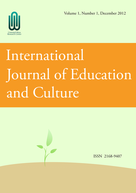


Volume 13 Issues 3-4 (2024-12-31)
Volume 13 Issues 1-2 (2024-06-30)
Volume 12 Issues 3-4 (2023-12-31)
Volume 12 Issues 1-2 (2023-06-30)
Volume 10 Issues 1&2 (2021-06-30)
Volume 9 Issues 3&4 (2020-12-31)
Volume 9 Issues 1&2 (2020-06-30)
Volume 8 Issues 3&4 (2019-12-31)
Volume 8 Issues 1&2 (2019-06-30)
Volume 7 Issues 3&4 (2018-12-31)
Volume 7 Issues 1&2 (2018-06-30)
Volume 6 Issues 3&4 (2017-12-31)
Volume 6 Issues 1&2 (2017-06-30)
Volume 5 Issues 3&4 (2016-12-31)
Volume 5 Issues 1&2 (2016-06-30)
Volume 4 Issues 3&4 (2015-12-31)
This paper presents a part of the findings from the first cross-cultural study of mathematics teaching conducted in two selected high schools of India and the U.S. The data collection procedures yielded a data corpus that consisted of transcripts from pre and post-observation interviews, video recordings of a sequence of at least three lessons for each teacher, field notes, concept map activity, and classroom artifacts. The paper explored the conceptions of teachers recommended as competent by their principals about mathematics and the effective teaching of mathematics in the two settings, and tried to understand the extent to which teachers’ conceptions and instructional practices are influenced by the culture of the two high achieving schools in the research settings.
Using a quantitative approach, this study examined 185 non-English speaking international graduate students’ academic anxiety while they were studying at North American universities. An academic anxiety scale for graduate students (AASGS) with 20 five-point Likert scale items was first constructed around four components, i.e., course assignment anxiety (AA), classroom anxiety (CA), program expectation anxiety (EA); and relationship anxiety (RA); the relationships among these components were then examined; and finally the effects of gender, age, and program of graduate study on international graduate students’ academic anxiety were investigated. The results indicated that there was a significant strong and positive correlation among the four components of academic anxiety; further, the international graduate students are generally experiencing academic anxiety while they are studying at North American universities; and female students experienced significantly higher academic anxiety than the male students. Implications for North American institutional leadership and administration are discussed.